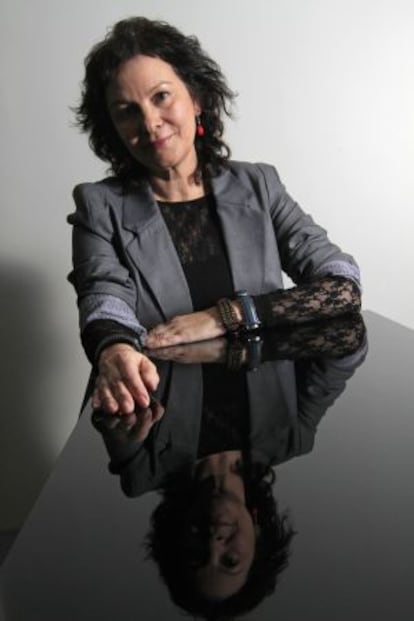Planeta Novel Prize honors Clara Sánchez and ex-minister González-Sinde
Publishing house names ‘El cielo ha vuelto’ as its Spanish book of the year

These are no times for experimentation in the publishing industry. And if it turns out that in Spain it is women who read the most — 64 percent, 10 percentage points more than men — and principally those between the ages of 25 and 54, it comes as no surprise that a feminine perspective and depictions of everyday life defined the two books that triumphed at the 62nd Planeta Novel Prize in Barcelona on Tuesday evening.
First prize — worth 601,000 euros — went to bestselling author Clara Sánchez for her work El cielo ha vuelto (Heaven has returned) with screenwriter and former culture minister Ángeles González-Sinde named runner-up for her debut novel for adults, El buen hijo (The good son).
It was only the third time in the history of the prize, which has been handed out by the Grupo Planeta publishing house for the best new novels in Spanish since 1952, that both awards went to women, after the 1999 and 2001 editions.
“Stendhal said that we are details,” Sánchez likes to say. She has always loaded her characters with dense psychological layers, a trend she continues in El cielo ha vuelto, which tells the story of a successful catwalk model who is told by a clairvoyant on a flight that someone wants to kill her. The revelation leads her to reconsider her whole life and look at everything again with fresh eyes.
Sánchez says she got the idea when, flicking through a magazine in the hairdresser’s, she identified a “look of terror in the typical image of a lethargic model.”
Out of that came the story of a young woman who “has everything but who starts to feel doubt and mistrust.” A mistrust, says Sánchez, “that has been generated in the whole of society, which is why I wanted to investigate if it takes us to cruelty or clarity.”
It is a plot in keeping with a literary career spanning 25 years and 10 novels, which began with Piedras preciosas (Precious stones) in 1989. Stories with a base in reality, introspective characters and an emotional aura have characterized works such as 1996’s Desde el mirador (From the viewpoint); Últimas noticias del paraíso (Latest news from paradise), which won the 2000 Alfaguara novel prize; and her bestselling Lo que esconde tu nombre (What hides your name), which won the 2010 Nadal award.
The big surprise of the night was González-Sinde’s runner-up prize, worth 150,250 euros, for her nimble modern comedy that narrates the vicissitudes of a timid 36-year-old man who lives and works under the shadow of his widowed mother — a suffocating atmosphere that changes with the arrival of a Romanian maid. “Vicente is a character thrown out of other stories I did who I wanted to recover,” said the former Socialist minister, who said she was delighted to get back to a life of “peace and quiet as a writer” after her spell in politics.
Not that there was much getting away from it at the gala in Barcelona’s Palacio de Congresos. Though the majority of the 1,300 guests belonged to the press — almost a quarter — the politicians also had their own task to carry out. To the left of Grupo Planeta president José Manuel Lara sat Catalan regional premier Artur Mas of the pro-independence CiU, who as he listened to the voting unfold, must have still been remembering the publisher’s words on Monday when he said the independence of Catalonia was “impossible, and we all know it.”
Tu suscripción se está usando en otro dispositivo
¿Quieres añadir otro usuario a tu suscripción?
Si continúas leyendo en este dispositivo, no se podrá leer en el otro.
FlechaTu suscripción se está usando en otro dispositivo y solo puedes acceder a EL PAÍS desde un dispositivo a la vez.
Si quieres compartir tu cuenta, cambia tu suscripción a la modalidad Premium, así podrás añadir otro usuario. Cada uno accederá con su propia cuenta de email, lo que os permitirá personalizar vuestra experiencia en EL PAÍS.
¿Tienes una suscripción de empresa? Accede aquí para contratar más cuentas.
En el caso de no saber quién está usando tu cuenta, te recomendamos cambiar tu contraseña aquí.
Si decides continuar compartiendo tu cuenta, este mensaje se mostrará en tu dispositivo y en el de la otra persona que está usando tu cuenta de forma indefinida, afectando a tu experiencia de lectura. Puedes consultar aquí los términos y condiciones de la suscripción digital.








































